Del Monte Pacific Bundle
Who Really Owns Del Monte Pacific?
Delving into Del Monte Pacific SWOT Analysis reveals the intricate ownership structure that shapes its destiny. Understanding the dynamics of Del Monte ownership is key to grasping its strategic moves in the competitive food and beverage industry. From its humble beginnings to its current global presence, the company's journey is inextricably linked to its shareholders and their vision.
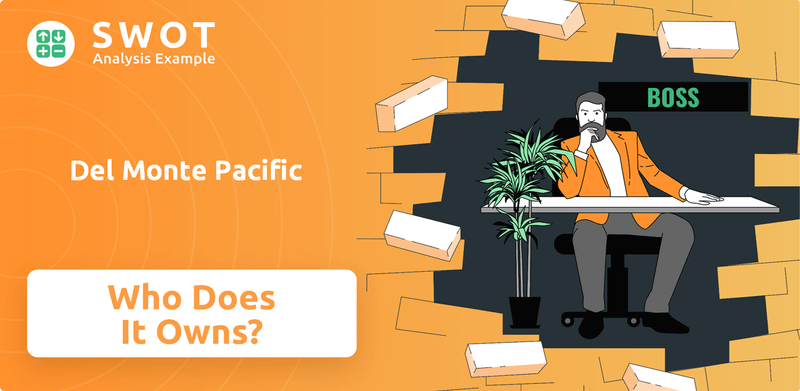
The story of Del Monte Pacific, a prominent Philippine company, is a fascinating exploration of corporate governance and market influence. Knowing who owns Del Monte is critical for investors and stakeholders alike, especially considering the company's significant market capitalization as of early 2025. This analysis examines the evolution of Del Monte Pacific company ownership details, from its founding to the present day, profiling major stakeholders and exploring the impact of its complex company structure.
Who Founded Del Monte Pacific?
The founding ownership of Del Monte Pacific Limited (DMPL) primarily traces back to the NutriAsia Group, controlled by the Campos family. While the Del Monte brand has a long history, DMPL was incorporated in Singapore in 1999. This structure reflects a strategic corporate move by an established group rather than a typical startup scenario.
At its inception, the ownership was largely consolidated under the NutriAsia Group, a significant food and beverage entity in the Philippines. The Campos family's vision for Del Monte Pacific was to broaden the brand's global reach, leveraging its existing recognition. This expansion strategy is evident in the initial ownership distribution, with the family retaining a controlling interest to guide long-term strategy and growth.
The early ownership structure of Del Monte Pacific was not characterized by angel investors or venture capital in the traditional sense. Instead, the formation involved a strategic restructuring and expansion driven by the Campos family through their various entities. This approach allowed for a focused expansion of the brand, building on its established global presence. The initial agreements would have been more aligned with corporate governance within the NutriAsia Group rather than individual founder vesting schedules.
The Campos family, through the NutriAsia Group, held the initial controlling stake in Del Monte Pacific. This structure facilitated the expansion of the Del Monte brand.
The formation of Del Monte Pacific was a strategic corporate restructuring rather than a venture-backed startup. This approach was designed to leverage the brand's global recognition.
The Campos family aimed to expand Del Monte's presence globally, reflecting in the ownership distribution. This strategy focused on long-term growth.
Early agreements were aligned with corporate governance within the NutriAsia Group. There were no widely reported initial ownership disputes.
Del Monte Pacific is listed on the Singapore Exchange (SGX). This provides a platform for public investment and ownership.
The shareholder structure has evolved since its inception. Institutional investors and public shareholders now hold significant stakes.
Understanding the early ownership of Del Monte Pacific provides crucial insights into its strategic direction and corporate structure. The Campos family's initial control facilitated the brand's global expansion. For further insights, you can explore the Competitors Landscape of Del Monte Pacific.
- The NutriAsia Group, led by the Campos family, was the primary founding owner.
- The company's formation was a strategic corporate move, not a venture-backed startup.
- The initial ownership structure supported the expansion of the Del Monte brand globally.
- Del Monte Pacific is now a publicly listed company on the SGX.
Del Monte Pacific SWOT Analysis
- Complete SWOT Breakdown
- Fully Customizable
- Editable in Excel & Word
- Professional Formatting
- Investor-Ready Format
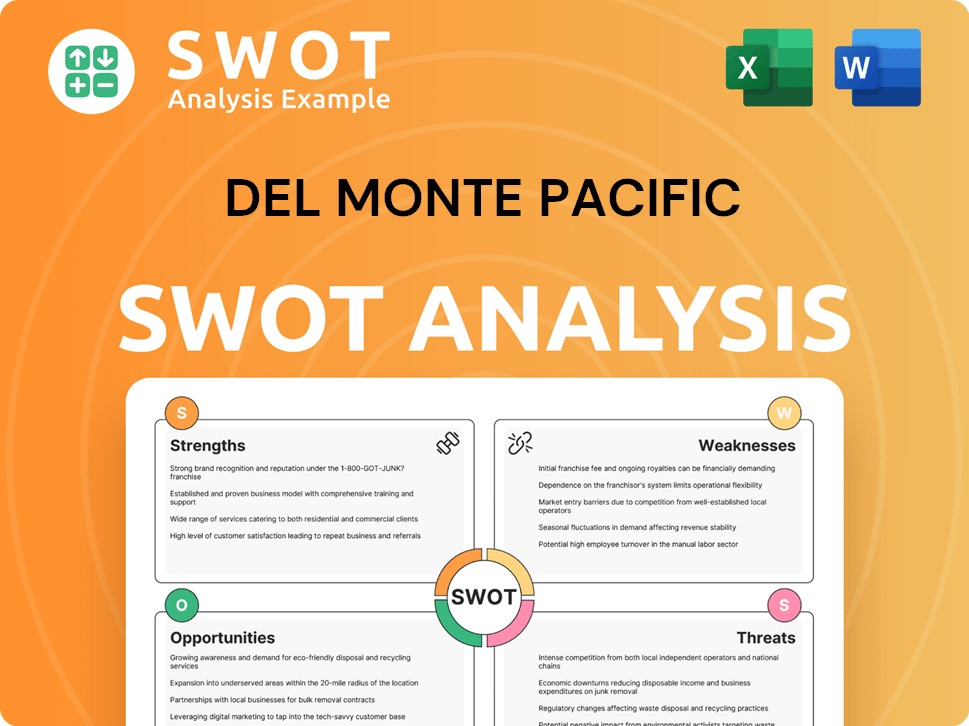
How Has Del Monte Pacific’s Ownership Changed Over Time?
The ownership structure of Del Monte Pacific has seen significant shifts, particularly after its listing on the Singapore Exchange (SGX) and the Philippine Stock Exchange (PSE). A pivotal moment was the 2014 acquisition of Del Monte Foods' US packaged food business for approximately US$1.675 billion. This strategic move, funded through a combination of debt and equity, broadened the shareholder base, influencing the Del Monte ownership landscape.
The acquisition of the US packaged food business in 2014 was a major financial undertaking. This transaction, valued at around US$1.675 billion, significantly impacted the company's capital structure. The funding strategy, involving both debt and equity, led to a more diverse group of shareholders. This expansion in the shareholder base increased the need for transparency and influenced the company's strategic direction towards more shareholder-centric policies.
| Key Event | Impact on Ownership | Financial Implications |
|---|---|---|
| Listing on SGX and PSE | Public offering of shares | Increased capital, enhanced visibility |
| Acquisition of Del Monte Foods' US business (2014) | Expanded shareholder base, increased public float | US$1.675 billion transaction, debt and equity financing |
| Ongoing market activities | Fluctuations in institutional and public holdings | Share price volatility, impact on investor confidence |
As of April 2025, the primary stakeholder in Del Monte Pacific remains NutriAsia Pacific Limited, a subsidiary of the NutriAsia Group, controlled by the Campos family. This group typically holds a substantial controlling interest, often between 67% and 70% of the company's shares. Other significant shareholders include institutional investors like BlackRock, Inc. and The Vanguard Group. The Del Monte Pacific company ownership details are regularly updated in annual reports and SEC filings, providing a comprehensive view of the shareholder structure. For further insights into the company's background, you can explore the Brief History of Del Monte Pacific.
The Campos family, through NutriAsia Pacific Limited, maintains significant control, typically holding around 67% to 70% of the shares.
- Institutional investors like BlackRock and Vanguard hold substantial stakes.
- The 2014 acquisition of Del Monte Foods' US business was a pivotal event.
- Public listings on SGX and PSE broadened the shareholder base.
- Understanding who owns Del Monte is crucial for investors.
Del Monte Pacific PESTLE Analysis
- Covers All 6 PESTLE Categories
- No Research Needed – Save Hours of Work
- Built by Experts, Trusted by Consultants
- Instant Download, Ready to Use
- 100% Editable, Fully Customizable
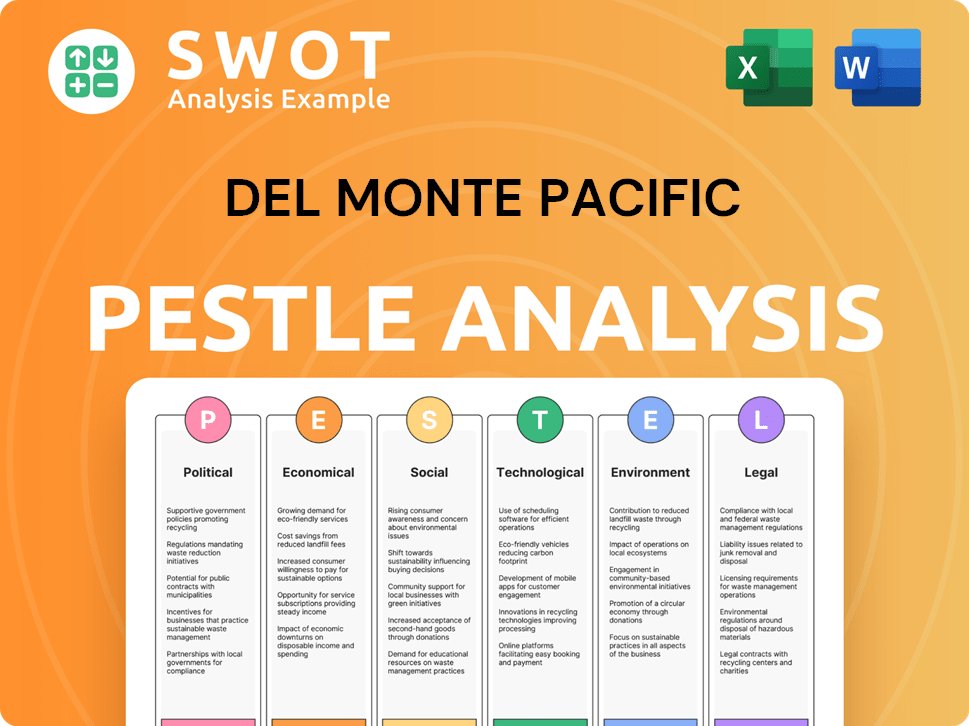
Who Sits on Del Monte Pacific’s Board?
The Board of Directors of Del Monte Pacific plays a pivotal role in the company's governance, reflecting its ownership structure. As of early 2025, the board typically includes a mix of representatives from major shareholders, notably the controlling Campos family, and independent directors. Key individuals from the Campos family often hold significant positions, including the Chairman role, ensuring their strategic vision is implemented. Independent directors provide objective oversight and represent the interests of all shareholders. The composition of the board is crucial for understanding Del Monte ownership and the overall company structure.
Del Monte Pacific, a Philippine company, ensures that its board includes independent directors to maintain a balance of perspectives. These directors, who are not employees of the company and don't have significant business relationships with it, are essential for providing unbiased oversight. The board's structure is designed to align with the company's long-term strategic goals, as outlined in the Growth Strategy of Del Monte Pacific.
| Board Role | Description | Typical Composition |
|---|---|---|
| Chairman | Leads the board and ensures effective governance. | Often a member of the Campos family. |
| Independent Directors | Provide objective oversight and represent all shareholders. | Individuals with no prior employment or significant business ties to the company. |
| Executive Directors | Oversee the company's operations and strategic direction. | Often include key executives. |
The voting structure of Del Monte Pacific generally operates on a one-share-one-vote basis for its ordinary shares. However, the substantial majority ownership held by NutriAsia Pacific Limited effectively grants the Campos family outsized control. This means that while minority shareholders have voting rights, the controlling shareholder's votes are typically sufficient to pass resolutions and elect directors, shaping the company's strategic direction and major decisions. This is a key aspect of who owns Del Monte and influences how major decisions are made within Del Monte Foods.
The Board of Directors is crucial for Del Monte Pacific's governance. The board includes members from the controlling family and independent directors. This structure ensures strategic alignment and objective oversight.
- Board members include representatives from major shareholders.
- Independent directors provide unbiased oversight.
- The Campos family often holds key leadership positions.
- Voting rights are generally one-share-one-vote, but major shareholders have significant control.
Del Monte Pacific Business Model Canvas
- Complete 9-Block Business Model Canvas
- Effortlessly Communicate Your Business Strategy
- Investor-Ready BMC Format
- 100% Editable and Customizable
- Clear and Structured Layout
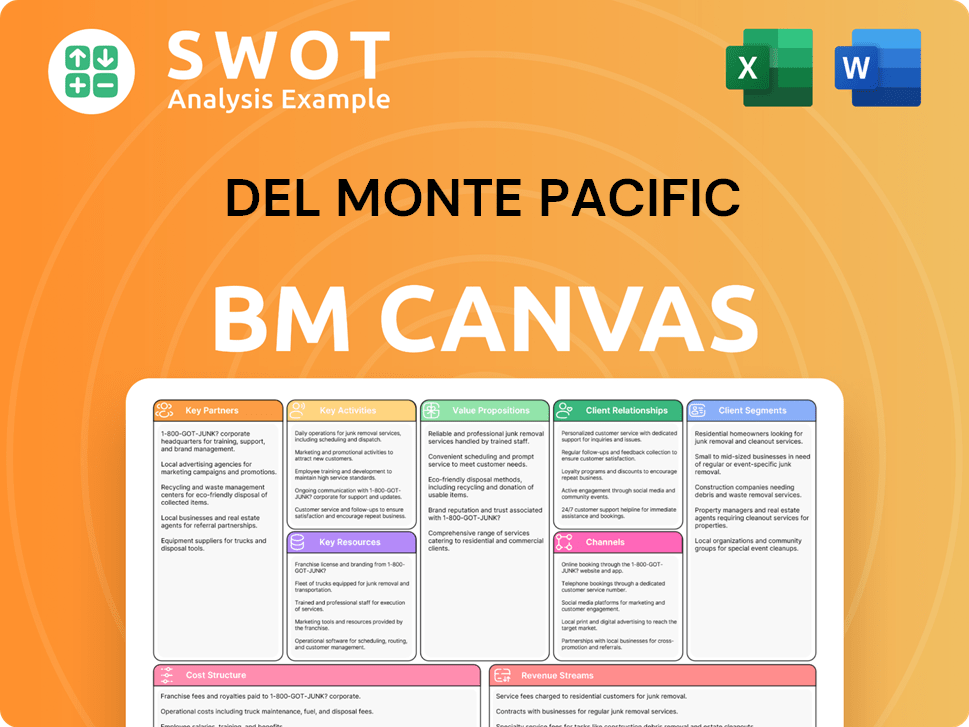
What Recent Changes Have Shaped Del Monte Pacific’s Ownership Landscape?
Over the past few years (2022-2025), the ownership structure of Del Monte Pacific has remained relatively stable, with the Campos family maintaining a significant controlling stake. This stability reflects a strategic decision to maintain long-term control and focus on operational improvements. While there haven't been major shifts in the primary ownership, the company has concentrated on enhancing its financial performance and optimizing its capital structure, which can indirectly influence investor sentiment and shareholding patterns.
Recent financial data indicates efforts to reduce debt. For instance, net debt decreased by 40% to US$725.1 million in the nine months ending January 31, 2025, from US$1.2 billion in April 2020. This financial strategy can make the stock more appealing to institutional investors. Industry trends, such as the growing importance of ESG factors, also influence investor decisions, potentially impacting the company's shareholder base.
The focus for Del Monte Pacific appears to be on operational growth and market expansion, supported by its current ownership structure. There have been no public announcements suggesting plans for significant changes in the controlling ownership. The consistent ownership by the Campos family underscores a commitment to long-term strategic goals. This stability is crucial as the company navigates market dynamics and pursues its business objectives. The company's headquarters are located in Singapore, with significant operations in the Philippines, making it a notable Philippine company.
| Aspect | Details | Impact |
|---|---|---|
| Ownership Stability | Campos family maintains controlling stake. | Ensures long-term strategic focus. |
| Debt Reduction | Net debt decreased by 40% (Jan 2025). | Enhances investor appeal, improves financial health. |
| ESG Factors | Increasing influence on institutional investors. | May influence shareholding patterns. |
The Campos family holds a significant controlling stake in Del Monte Pacific. This ownership structure provides stability and a long-term strategic focus for the company.
Del Monte Pacific has focused on reducing debt, which can make the stock more attractive to investors. Net debt decreased by 40% as of January 2025.
ESG factors are increasingly influencing investment decisions. This trend can impact the company's shareholder base and investor relations. Institutional investors are taking notice.
The company is focused on operational improvements and market expansion. No major changes in the controlling ownership are expected in the near future.
Del Monte Pacific Porter's Five Forces Analysis
- Covers All 5 Competitive Forces in Detail
- Structured for Consultants, Students, and Founders
- 100% Editable in Microsoft Word & Excel
- Instant Digital Download – Use Immediately
- Compatible with Mac & PC – Fully Unlocked
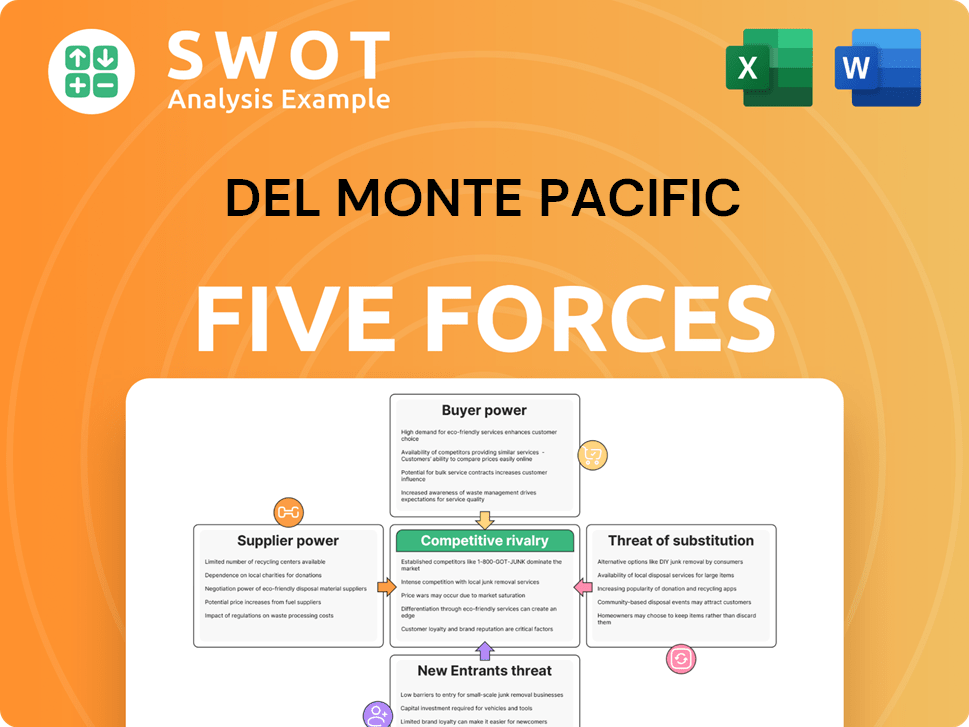
Related Blogs
- What are Mission Vision & Core Values of Del Monte Pacific Company?
- What is Competitive Landscape of Del Monte Pacific Company?
- What is Growth Strategy and Future Prospects of Del Monte Pacific Company?
- How Does Del Monte Pacific Company Work?
- What is Sales and Marketing Strategy of Del Monte Pacific Company?
- What is Brief History of Del Monte Pacific Company?
- What is Customer Demographics and Target Market of Del Monte Pacific Company?
Disclaimer
All information, articles, and product details provided on this website are for general informational and educational purposes only. We do not claim any ownership over, nor do we intend to infringe upon, any trademarks, copyrights, logos, brand names, or other intellectual property mentioned or depicted on this site. Such intellectual property remains the property of its respective owners, and any references here are made solely for identification or informational purposes, without implying any affiliation, endorsement, or partnership.
We make no representations or warranties, express or implied, regarding the accuracy, completeness, or suitability of any content or products presented. Nothing on this website should be construed as legal, tax, investment, financial, medical, or other professional advice. In addition, no part of this site—including articles or product references—constitutes a solicitation, recommendation, endorsement, advertisement, or offer to buy or sell any securities, franchises, or other financial instruments, particularly in jurisdictions where such activity would be unlawful.
All content is of a general nature and may not address the specific circumstances of any individual or entity. It is not a substitute for professional advice or services. Any actions you take based on the information provided here are strictly at your own risk. You accept full responsibility for any decisions or outcomes arising from your use of this website and agree to release us from any liability in connection with your use of, or reliance upon, the content or products found herein.